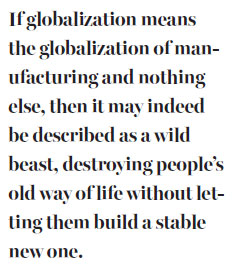The pros and cons of globalization
Updated: 2016-10-28 07:26
By Ed Zhang(China Daily Europe)
|
|||||||||
Chinese may mourn dramatic change of sentiment in the West - but we, too, must be prepared to embrace change
Many Chinese people can't imagine that globalization - a process that has brought so many of them high incomes and even higher hopes - can no longer race forward like a high-speed train.
The US presidential election and so many political changes in the world have signaled a slowdown, if not a U-turn, in orientation, at least for the next couple of years.
The sluggish recovery since the 2008 world financial crisis, compounded by the stagnation of incomes in recent years, has given rise to such a strong anti-globalization mood among voters in North America and Europe that politicians simply can't ignore it. The Chinese tend to play down the significance of everything they hear from the presidential debates as mere campaign rhetoric.

No. Campaign rhetoric is designed first of all for mass consumption. And when both candidates are calling for a retreat from where Barack Obama stands, it reflects a virtual agreement between conservatives and liberals - and between liberals, left and right in the case of Europe - that the notion of globalization is too costly to defend.
No politician can hope to win votes and pass society's legitimacy test by continuing to wave the flag for open markets and free trade.
The change may come as a surprise for people in Asia, the greatest beneficiaries of the flourishing global market in the last half century - for the Chinese only since they joined the WTO in 2001 and for the Indians maybe for an even shorter period.
It may be like seeing an old teacher suddenly act out of character, like a Confucian scholar one day tossing away the Analects and telling his students it's all wrong.
Was Adam Smith wrong? Was he too blind to see that free trade benefits all human societies, not just poor countries?
Or did institutions like the IMF and World Bank, once labeled the dirty hands of capitalism by small anti-globalization groups, truly play a dirty role, destroying the social texture of capitalism?
Actually, the woes of rich countries are mirrored in Asia, including China. The Wall Street Journal recently ran a report about how jobs are elusive in China, too, as export-oriented industries have left once-booming factory towns almost deserted, fleeing the recent rise in labor and regulatory costs.
The fact is that, despite an immense increase in industrial output, there hasn't been as much of an increase in the number of jobs. In other words, manufacturing doesn't hire people as quickly as it makes things. Otherwise there would be no talk about efficiency.
By the same logic, industry only needs to hire a lot of people only when it doesn't involve a major capital outlay, or when the cost of labor is low. Such low-value-added industry can only find its supply of potential employees in a country with an even lower average income.

When simple manufacturing comes, it turns a massive number of peasants into factory workers. And when it goes, it leaves a massive number of low-skilled workers unemployed. Many factories are transient phenomena, like tourists at a summer resort.
If globalization means the globalization of manufacturing and nothing else, then it may indeed be described as a wild beast, destroying people's old way of life without letting them build a stable new one.
So a universal lesson is that no country can build a stable middle class by relying on simple manufacturing activities.
Being described as "the factory of the world" makes people feel proud. But it is also an irony. No country can sit comfortably with such a title for long.
The more advanced and efficient industry is, the less human labor it employs. So the fundamental cause of the job- and income-related social crisis in the rich countries is not that all the old industrial jobs have gone to China or to India. Those jobs are globally mobile, moving to a new place every 10 to 20 years, always chasing the lowest wage level.
It is fair to say that having some manufacturing only allows a country to establish a starting point. It then needs to move on quickly to a second stage of modernity featuring a large variety of local services driven by better institutions and technology - along with jobs that perhaps don't vanish as quickly.
Based on China's experience, the IMF and World Bank should start telling other developing countries that, as the pace of globalization is unstoppable and increasingly intense, the window of opportunity for a developing country to implement such a transition has become very narrow.
The author is an editor-at-large of China Daily.
(China Daily European Weekly 10/28/2016 page13)
Today's Top News
Party ramps up supervision
Queen Elizabeth visits new town Poundbury
UK retailers catering for homesick Chinese
UK government opts for new Heathrow runway
China's business leaders optimistic about UK
Workers tear down Calais 'Jungle'
UK university heads Chinese pregnancy research
Chinese hostages freed by pirates are heading home
Hot Topics
Lunar probe , China growth forecasts, Emission rules get tougher, China seen through 'colored lens', International board,
Editor's Picks

|

|

|

|

|

|







